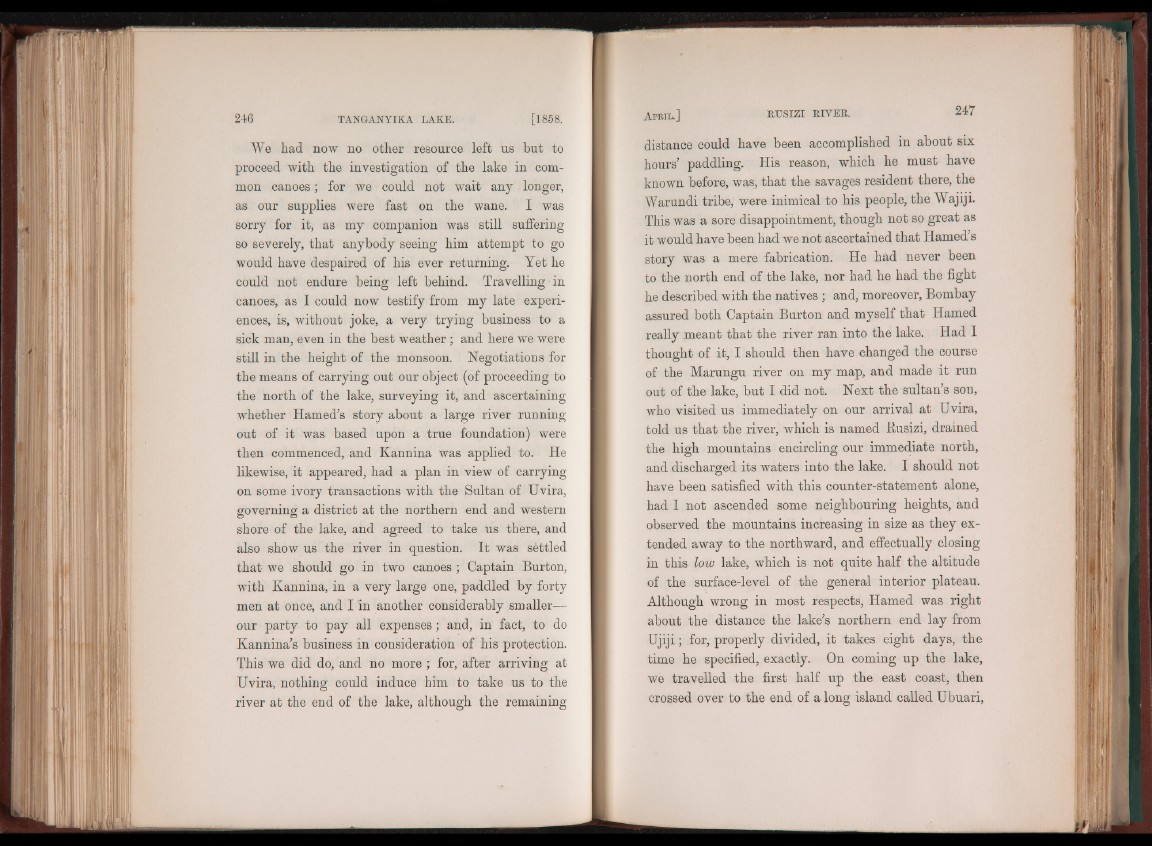
We had now no other resource left us but to
proceed with the investigation of the lake in common
canoes; for we could not wait any longer,
as our supplies were fast on the wane. I was
sorry for it, as my companion was still suffering
so severely, that anybody seeing him attempt to go
would have despaired of his ever returning. Yet he
could not endure being left behind. Travelling in
canoes, as I could now testify from my late experiences,
is, without joke, a very trying business to a
sick man, even in the best weather ; and here we were
still in the height of the monsoon. Negotiations for
the means of carrying out our object (of proceeding to
the north of the lake, surveying it, and ascertaining
whether Hamed’s story about a large river running
out of it was based upon a true foundation) were
then commenced, and Kannina was applied to. He
likewise, it appeared, had a plan in view of carrying
on some ivory transactions with the Sultan of Uvira,
governing a district at the northern end and western
shore of the lake, and agreed to take us there, and
also show us the river in question. It was settled
that we should go in two canoes| Captain Burton,
with Kannina, in a very large one, paddled by forty
men at once, and I 'in another considerably smaller—
our party to pay all expenses; and, in fact, to do
Kannina’s business in consideration of his protection.
This we did do, and no more ; for, after arriving at
Uvira, nothing could induce him to take us to the
river at the end of the lake, although the remaining
distance could have been accomplished in about six
hours’ paddling. His reason, which he must have
known before, was, that the savages resident there, the
Warundi tribe, were inimical to his people, the Wajiji.
This was a sore disappointment, though not so great as
it would have been had we not ascertained that Hamed’s
story was a mere fabrication. He had never been
to the north end of the lake, nor had he had the fight
he described with the natives ; and, moreover, Bombay
assured both Captain Burton and myself that Hamed
really meant that the river ran into the lake. Had I
thought of it, I should then have changed the course
of the Marungu river on my map, and made it run
out of the lake, but I did not. Next the sultan’s son,
who visited us immediately on our arrival at Uvira,
told us that the river, which is named Rusizi, drained
the high mountains encircling our immediate north,
and discharged its waters into the lake. I should not
have been satisfied with this counter-statement alone,
had I not ascended some neighbouring heights, and
observed the mountains increasing in size as they extended
away to the northward, and effectually closing
in this low lake, which is not quite half the altitude
of the surface-level of the general interior plateau.
Although wrong in most respects, Hamed was right
about the distance the lake’s northern end lay from
Ujiji; for, properly divided, it takes eight days, the
time he specified, exactly. On coming up the lake,
we travelled the first half up the east coast, then
crossed over to the end of a long island called Ubuari,